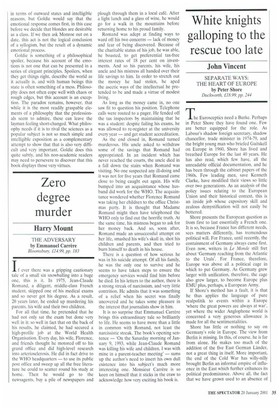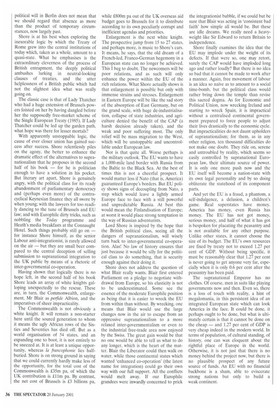White knights galloping to the rescue too late
John Vincent
SEPARATE WAYS: THE HEART OF EUROPE by Peter Shore Duckworth, £18.99. pp. 244 he Eurosceptics need a Burke. Perhaps in Peter Shore they have found one. Few are better equipped for the role. As Labour's shadow foreign secretary, shadow chancellor, trade minister in 1974-79, and the bright young man who briefed Gaitskell on Europe in 1960, Shore has lived and breathed Europe for the last 40 years. He has also read, which few have, all the unreadable official documentation, and he has been through the cabinet papers of the 1960s. Few leading men, save Kenneth Clarke, have modified their views so little over two generations. As an analysis of the policy issues relating to the European Union and their historical context, this is an inside job whose expository skill and zealous demystification will not easily be bettered.
Shore presents the European question as from first to last essentially a French one. It is so, because France has different needs, sees matters differently, has tremendous political will. For France, until recently, the containment of Germany always came first. Even now, writers in Le Monde still fret about 'Germany reaching from the Atlantic to the Urals'. For France, therefore, Europe was above all a political cage in which to put Germany. As Germany grew larger with unification, therefore, the cage also grew larger, to become Europe plus EMU plus, perhaps, a European Army.
if Shore's method has a fault, it is that he thus applies the language of pure realpolitik to events within a Europe 'where the great powers are always at war', yet where the wider Anglophone world is concerned a very generous allowance is made for all the sentimentalities.
Shore has little or nothing to say on Germany's role in Europe. The view from Berlin is missing. In this, of course, he is far from alone. He makes too much of the addition of the five East German Lander, not a great thing in itself. More important, the end of the Cold War has willy-nilly brought Berlin an informal empire of influence in the East which further enhances its political predominance. Above all, the fact that we have grown used to an absence of political will in Berlin does not mean that we should regard that absence as more than the product of temporary circumstances, now largely past.
Shore is at his best when exploring the inexorable logic by which the Treaty of Rome grew into the central institutions of today which, taken as a whole, amount to a quasi-state. What he emphasises is the extraordinary cleverness of the process of British entrapment, the deeply political ambushes lurking in neutral-looking clauses of treaties, and the utter helplessness of a British public which had not the slightest idea what was really going on.
The classic case is that of Lady Thatcher who had a huge extension of Brussels powers foisted on her by having dangled before her the supposedly free-market scheme of the Single European Treaty (1985). If Lady Thatcher could be led up the garden path, what hope was there for lesser mortals?
With apparently unstoppable logic, the cause of ever closer union has gained success after success. Shore relentlessly piles on the agony, the better to enhance the dramatic effect of the alternatives to supranationalism that he proposes in the second half of his book — for he is politician enough to have a solution in his pocket. But literary art apart, Shore is genuinely angry, with the political class for its ready abandonment of parliamentary democracy and (perhaps even more) of the contracyclical Keynesian finance they all swore by when young; with the lawyers for too readily dancing to the tune of Brussels and EU law; and with Europhile dirty tricks, such as nobbling the Today programme and Heath's media breakfasts at the Connaught Hotel. Such things probably still go on — for instance Shore himself, as the senior Labour anti-integrationist, is rarely allowed on the air — but they are small beer compared to the central deception of selling submission to supranational integration to the UK public by means of a rhetoric of inter-governmental co-operation.
Having shown that logically there is no hope left, in the second half of his book Shore leads an array of white knights galloping unexpectedly to the rescue. These are, in turn, the Commonwealth, enlargement, Mr Blair as perfide Albion, and the imperatives of sheer impracticality.
The Commonwealth is not obviously a white knight. It will remain a non-starter here until the soured generation to whom it means the ugly African rows of the Sixties and Seventies has died off. But as a world organisation of 54 states, and an expanding one to boot, it is not entirely to be sneezed at. It is at least a unique opportunity, whereas In francophonie lies halfburied. Shore is on strong ground in saying that we could currently hardly make less of the opportunity, for the total cost of the Commonwealth is £35m pa, of which the UK contribution is £11m pa. By contrast, the net cost of Brussels is £3 billions pa, while £800m pa out of the UK overseas aid budget goes to Brussels for it to distribute according to its own peculiarly corrupt and inefficient agendas and priorities.
Enlargement is the next white knight. The prospective jump from 15 to 27 states, and perhaps more, is music to Shore's ears. It means, he says, that the old dream of a French-led, Franco-German hegemony in a European state can no longer be achieved. This I beg to doubt. The newcomers will be poor relations, and as such will only enhance the power within the EU of the rich relations. What Shore actually shows is that enlargement is possible but only with immense strains and stresses. Enlargement in Eastern Europe will be like the sad story of the absorption of East Germany, but on the grand scale, with huge de-industrialisation, collapse of state industries, and agriculture denied the benefit of the CAP (a harsh decision already taken), and the weak and poor suffering most. The only relief will be mass migration to the West, which will be unstoppable and uncontrollable under European law.
Nor is that quite all. Worse perhaps is the military outlook. The EU wants to have a 1,000-mile land border with Russia from the Baltic to the Black Sea. At the best of times this is not a cheerful prospect. It would matter less if Nato (that is, America) guaranteed Europe's borders. But EU policy shows signs of decoupling from Nato, a step which would leave a lightly armed Europe face to face with a still powerful and unpredictable Russia. At best this would mean the Finlandisation of Europe; at worst it would place strong temptation in the way of Russian adventurists.
Lord Shore is inspired by the hope that the British political class, seeing all the dangers of supranationalism, will wisely turn back to inter-governmental co-operation. Alas! No law of history ensures that just because it would be silly for the political class to do something, that is security enough against their doing it.
Shore does not address the question of what Blair really wants. Blair first entered Parliament on a pledge to negotiate withdrawal from Europe, so his elasticity is not to be underestimated. Some see the essence of the moderate Europhile position as being that it is easier to wreck the EU from within than without. By wrecking, one means that Blair would use the large changes now in the air to escape from an oppressive supranationalism to a more relaxed inter-governmentalism or even to the industrial free-trade area now enjoyed by the Swiss, The great gain would be that no one would be able to tell us what to do any longer, which is the heart of the matter. Blair the Liberator could then walk on water, while those continental states which wanted 'enhanced co-operation' (the latest name for integration) could go their own way with our full support. All the conflicts would melt away. If our Europhile grandees were inwardly concerned to prick
the integrationist bubble, if we could but be sure that Blair was acting in 'consistent bad faith' how simple all would be. But these are idle dreams. We really need a heavyweight like Sir Edward to return Britain to independence.
Shore finally examines the idea that the EU may implode under the weight of its defects. If that were so, one may retort, surely the CAP would have imploded long ago and rather loudly? But there is no idea so bad that it cannot be made to work after a manner. Again, free movement of labour is an idea so naive as to amount to a social time-bomb, but the political class would rather bring down the temple than revise this sacred dogma. As for Economic and Political Union, now wrecking Ireland and starting to wreck Spain, it is impractical without a centralised continental government prepared to force people to adjust their lives drastically to the economic cycle. But impracticalities do not daunt upholders of supranationalism; for them, as in any other religion, ten thousand difficulties do not make one doubt. They ride on, serene and untroubled by reality, which seems so easily controlled by supranational European law, their ultimate source of power. It is only one more push now and the EU itself will become a nation-state with its own legal personality and by so doing obliterate the statehood of its component parts.
And yet the EU is a fraud, a phantom, a self-indulgence, a delusion, a children's game. Real superstates have money. America has money, even Russia has money. The EU has not got money, serious money, and half of what it has got is bespoken for placating the peasantry and is not available for any other purpose. Unlike other states, it cannot choose the size of its budget. The EU's own resources are fixed by treaty not to exceed 1.27 per cent of GDP. Without being specific, it must be reasonably clear that 1.27 per cent is never going to get anyone very far, especially when it is only 0.6 per cent after the peasantry has been paid.
The supranational Emperor has no clothes. Of course, men in suits like playing governments now and then. Even so, there is a loss of touch with reality, a hint of megalomania, in this persistent idea of an integrated European state which can look America in the face. It could be done, it perhaps ought to be done, but what is ultimately certain is that it cannot be done on the cheap — and 1.27 per cent of GDP is very cheap indeed in the modern world. In terms of population, of cultural standing, of history, one can wax eloquent about the rightful place of Europe in the world. Otherwise, it is not just that there is no money behind the project now, but there is no plausible prospect of any future source of funds. An EU with no financial backbone is a sham, able to eviscerate strong nations but only to build a weak continent.































































 Previous page
Previous page